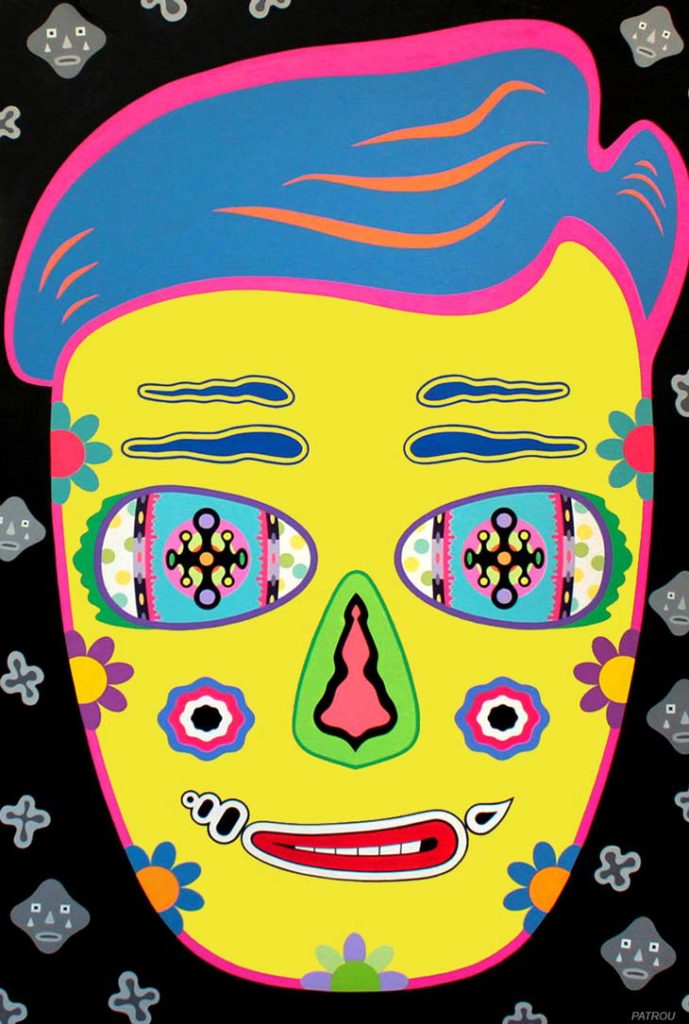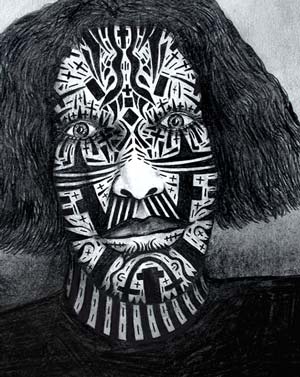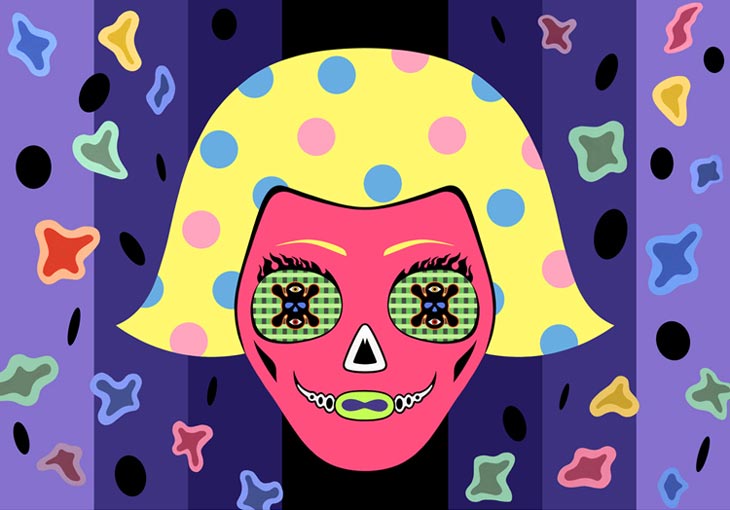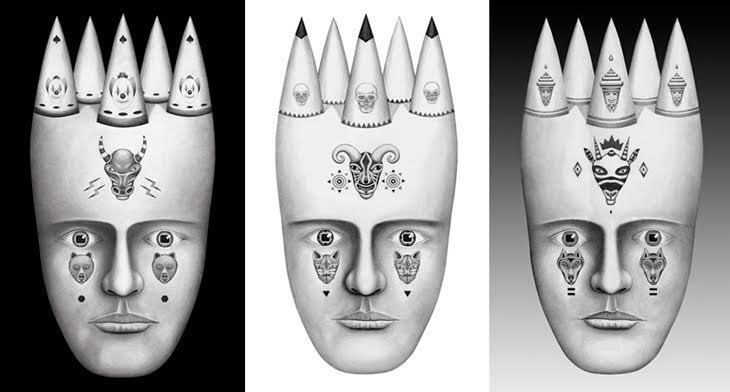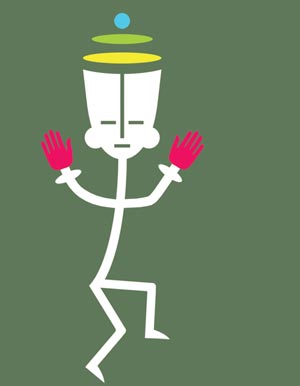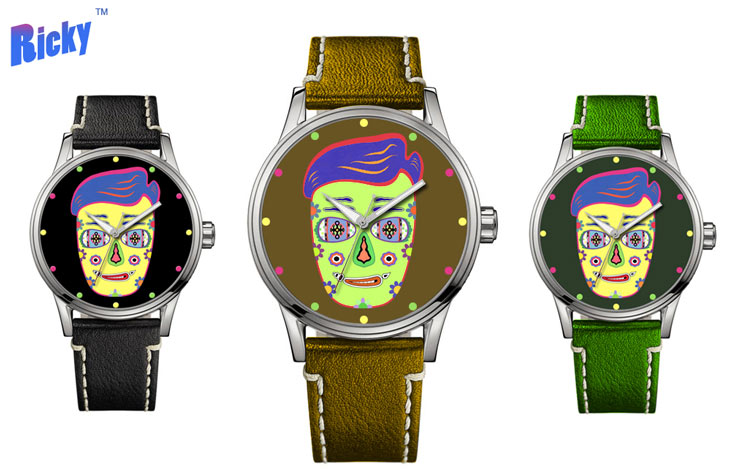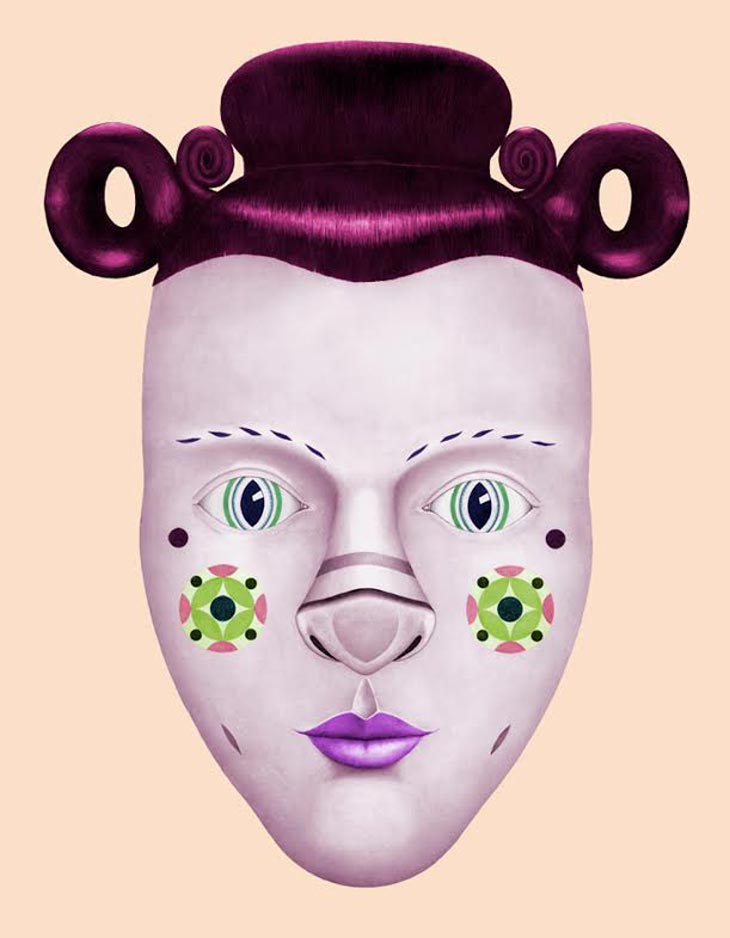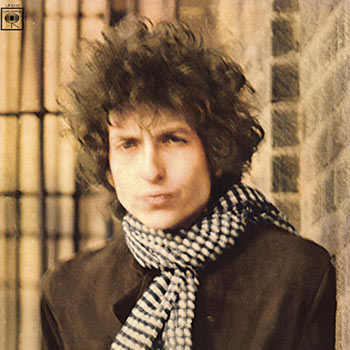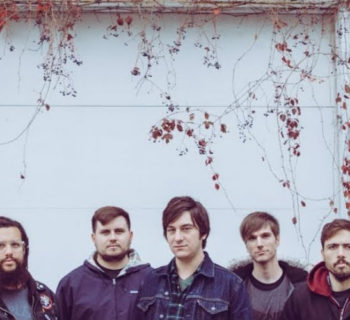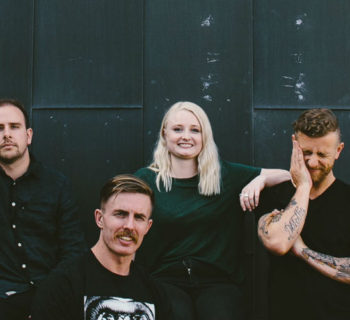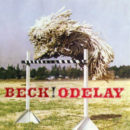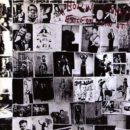Lou Patrou on Celebrity and Integrity
If art is created and no one sees it, does it make a sound?
Lou Patrou, a prolific visual artist based out of New York, has always created. “I’ve basically given my entire working life over to taking a chance on just following my creativity,” he tells Rawckus.
Over the course of four decades, he’s developed a massive body of work that includes graphite drawings of characters with hauntingly vacant stares and scenery filled with recurring gothic symbols to acrylic theatrical clown-like masks with shifting symmetrical shapes and vibrant interchangeable colors. Some of his paintings showcase such remarkable precision that they’re often mistaken for digital works.
Throughout all of these years of creation, he remained mostly unconcerned with publicity until the last decade or so. But a foray into the “art world,” even for a lifelong artist, is often less about art and more about money. As he discusses in our interview, between press releases and gallery showings, talent and originality tend to take a backseat to fame and plagiarism. So, how do artists seek recognition for their work without sacrificing their integrity?
Lou sits down with Rawkus to talk about his process, celebrity in the arts, and what it’s like to have a creative passion that you just can’t turn off.
I read in an interview with you, I think it was in Chronogram, which describes your work as belonging to three different categories: loose and scratchy pastels, decorative candy-like patterns and watercolors, and expressive pencil drawings. Is that how you would characterize it?
Lou Patrou: Yeah, that’s correct. I’ve kind of driven past the pastels, I’ve left them in the past, but I wish I could do those. When I lived in L.A., I had a tight little space of a studio, and I had to do smaller work. But I could do messier work there. That’s where I did all my pastel drawings because I could just mop up the floor with that stuff. Here, I have a different floor, and I’m just a renter. So, I can’t do big pastels.
What I’ve been doing since I moved here is large sheets of paper—40 x 60-inch sheets—and I’m doing large drawings and acrylic paintings on them. The acrylic sheets I like because I can lean over it and paint on them. I have more lights that I turn on around the table, it’s kind of like I’m doing something meticulous and obsessive, but that’s what I like to do.
When I was doing the pastels, it’s more like a drunk guy dancing, trying to get a feel for something. It really doesn’t have a purpose. It’s much more fancy-free. The things that I’ve been doing, the last four paintings that I did here, it took me two years to finish them. So I developed this really obsessive process for working on those, and I really enjoy the steps.
What are those steps?
LP: Well, what I do with everything now, I just sit around with some large sheets of scratch paper, like 11x14, and I’ll just get 100 sheets, and as fast as I can, start dashing out ideas to try and conjure up what I’m feeling and what I’m seeing on paper. The next couple days I’ll go back through all of my ideas. Then I take them [the drawings] and lay them all out and just pick the ones that interest me. Then the next couple days I’ll take the elements, like floating heads in water or liquid for this new idea I have, cut them out with scissors, and set them down onto a large blank white sheet and move it around to see where I like.
I have to put myself in a good mental situation before I do any artwork, or it’s just not coming out of enjoyment. So, when you get a piece of art of mine, it’s a labor of love. It’s something that I spent my best hours of the day and the best days of my life doing.
I read that you still have most or all of your original pieces.
LP: I pretty much have it all, yeah. It goes all the way back to the 70s.
Do you ever consider selling them?
LP: Here’s the conundrum. It’s never been practical for me to sell anything to strangers, because I could never get enough money for it. I’ve never made it to a point to where my work will command any kind of price that would make me want to sell anything, really. That’s the problem.
I have only started to try to create my own fame since I moved out here in 2000 but prior to that, I never cared about it. I never even showed any of my stuff to a gallery.
I feel like something unique or different comes out in the creation process when you’re not expecting a lot of people to look at it, you don’t have that gaze of someone else in your mind while you’re creating.
LP: Oh, I always do. I always think that someone else is going to look at this and appreciate this. I think most artists, ballerinas, choreographers, all do. They all look for approval. It’s just normal. They want other people to appreciate what they’ve created.
I think a lot of younger artists are really worried or scared about dedicating the rest of their life to their craft and not being able to make a living, or ever being recognized for it. How do you work past that?
LP: That’s very practical and realistic. You’ve heard the term starving artist and that’s not a joke; it’s not an exaggeration.
All these galleries, believe me, they have so many artists just bombarding them with emails and packets and phone calls and portfolios and visits. They won’t even look at a guy like me, because I’m kind of blue collar. They’re interested in artists people have taught them they should be looking at. In the art world, it’s really just open to what someone has told them or if someone is famous or getting buzz.
Have you known talented artists who did just get discouraged and leave?
LP: Well, you know, you meet people throughout life, friends and relatives and stuff that have said, “Well, I wanted to try songwriting or I wanted to be an actor, but I didn’t.” And the one thing I know is, when it’s all said and done, those are really on the list when people ask you on your death bed “do you have any regrets?” Yeah, I wanted to be a singer. Well, why didn’t you make a website and record songs? Why didn’t you send your CDs to Star Search or American Idol? Why didn’t you do those things? I’ve known people like that. They’ve just stayed in a job they really didn’t like but life gave them some other conditions like a kid or bills, and they had to start making money in an easier way and, you know, you just forget about your dreams sometimes.
Back in your teens and twenties, did you always know or think it was likely that you’d spend the rest of your life doing this?
LP: I knew that I would never turn it off. I do wonder if the ideas will stop coming to me. That question has always been there. And that’s a really pressing question for anyone creative. For me, it has never, ever stopped. Even when I was in my years when I partied a lot, I had a lot of hangovers, I did a lot of drinking, when I was in the military, out of the military, in L.A., it never stopped. I didn’t ask for it. You don’t ask for something like that. It’s just part of you.
But something could happen in three years, any medical health thing could happen that could stop everything. I don’t know what’s in the future. That’s another reason why I’m scrambling to push my output and get more and more publicity. The clock is ticking. When you get older, you start seeing that it would be nice to be able to make a living off of things. At this point, because I’ve stayed in the arts my entire life, I’ve never made anything for myself. I’ve basically given my entire working life over to taking a chance on just following my creativity.
I have to put myself in a good mental situation before I do any artwork, or it’s just not coming out of enjoyment. So, when you get a piece of art of mine, it’s a labor of love.
That’s a lot to sacrifice.
LP: That’s when they ask you, how dedicated are you? How many years have you given? If you want to be a writer, a journalist, let me know in 40 or 50 years how many years you’ve put into that, and then we’ll see. We’ll see if you were dedicated or just fucking around. Because you do see a lot of people in art like that. These street artists, like, what were you doing two years ago? Well, two years ago I was a DJ, but now I’m an artist.
Why do you think certain people are so dedicated to their craft?
LP: You can say with sarcasm that it’s a curse. Just like certain people are cursed to love food so much they just can’t stop overeating. It’s your destiny or something.
Well, to close out. Do you have any advice out there for other cursed artist out there?
LP: For me, probably the biggest thrill is coming up with something I’ve never seen before. That’s the damn fun of it. Making something original. People think it’s cool to copy. That ain’t cool. Other people came up with something new, you come up with something new. They should teach that at these art schools. I don’t know what they teach, I never went to one.
My whole thing is, never let go of your integrity. Never copy anyone else, never use anyone else’s ideas, and never make something, offer up something, that’s second rate. Because it’s on your record.

